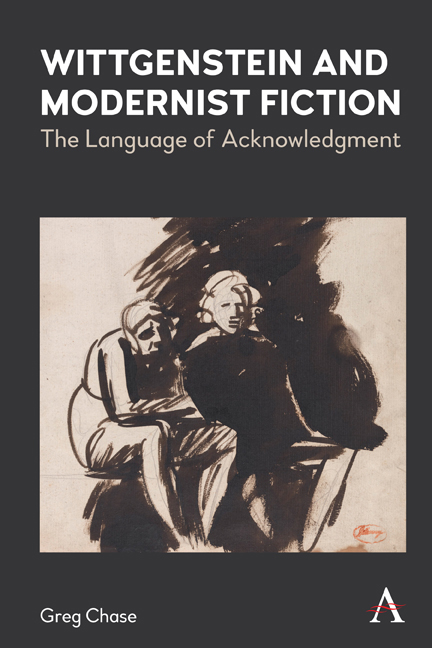Book contents
- Frontmatter
- Contents
- Acknowledgments
- List of Abbreviations
- Introduction: Modernist Philosophy and Modernist Fiction
- 1 “Who’s ‘We’?”: Claims to Community in Forster’s Howards End and Woolf ’s Mrs. Dalloway
- 2 “The Silent Soliloquy of Others”: Wittgenstein’s Pursuit of Acknowledgment
- 3 “To See with the Same Eyes”: Marriage and Same-Sex Intimacy in Ford, Woolf, and Larsen
- 4 Fragmenting Families, Private Language Fantasies: Faulkner’s The Sound and the Fury and As I Lay Dying
- 5 Seeing Humans as Humans: Wright’s Black Boy and Ellison’s Invisible Man
- Conclusion: Afterlives of Acknowledgment
- Notes
- Bibliography
- Index
2 - “The Silent Soliloquy of Others”: Wittgenstein’s Pursuit of Acknowledgment
Published online by Cambridge University Press: 27 April 2022
- Frontmatter
- Contents
- Acknowledgments
- List of Abbreviations
- Introduction: Modernist Philosophy and Modernist Fiction
- 1 “Who’s ‘We’?”: Claims to Community in Forster’s Howards End and Woolf ’s Mrs. Dalloway
- 2 “The Silent Soliloquy of Others”: Wittgenstein’s Pursuit of Acknowledgment
- 3 “To See with the Same Eyes”: Marriage and Same-Sex Intimacy in Ford, Woolf, and Larsen
- 4 Fragmenting Families, Private Language Fantasies: Faulkner’s The Sound and the Fury and As I Lay Dying
- 5 Seeing Humans as Humans: Wright’s Black Boy and Ellison’s Invisible Man
- Conclusion: Afterlives of Acknowledgment
- Notes
- Bibliography
- Index
Summary
Of all Britain's literary modernists, Virginia Woolf may have been the one who explored the problem of other-mind skepticism most urgently—and who produced the most memorably innovative fiction as a result. Of all the philosophers who lived and worked in Britain during the modernist period, perhaps the most unique and, ultimately, most influential to take up this same problem was Ludwig Wittgenstein. Just as Woolf 's fictions give narrative shape to epistemological questions, so Wittgenstein's philosophy uses literary techniques—dialogue, imagery, metaphor, suspense—to explore these same concerns. So it is a powerful irony of literature's relationship to philosophy in the modernist period that neither of these two towering figures had much intellectual interest in, or personal affection for, the other.
Ray Monk writes that Wittgenstein and Woolf “may have met” at some point through their mutual friend John Maynard Keynes, but that “neither seems to have made much impression on the other.” In fact, we can be even more definitive: Wittgenstein met both Leonard and Virginia Woolf in Sussex County, England, in late August 1925, at Keynes’ summer house in Lewes. Woolf documents this encounter in a letter dated September 20, 1925, and written to Saxon Sydney-Turner, another member of Leonard and E. M. Forster's Apostolic brethren. Woolf 's letter refers in passing to an argument between Sydney-Turner and Wittgenstein, noting gleefully that the typically reticent Sydney-Turner “talked without ceasing […] of the soul, and matter, till [Wittgenstein] was moved to offer himself to you as bootboy.” Woolf 's brief comment makes it difficult to discern the precise nature of Sydney-Turner and Wittgenstein's disagreement, though it is tempting to speculate that they argued over classical music, a subject about which both held strong opinions. What the letter does make clear is Woolf and Wittgenstein's antipathy toward each other. There were clear reasons for this mutual skepticism: Wittgenstein disliked the Bloomsbury Circle's tendency to engage in “frank discussion[s] of sex in the presence of ladies,” and during this same visit, he was apparently quite rude to Keynes's new wife, the Russian ballerina Lydia Lopokova, whom Keynes had married earlier that month.
- Type
- Chapter
- Information
- Wittgenstein and Modernist FictionThe Language of Acknowledgment, pp. 51 - 82Publisher: Anthem PressPrint publication year: 2022



